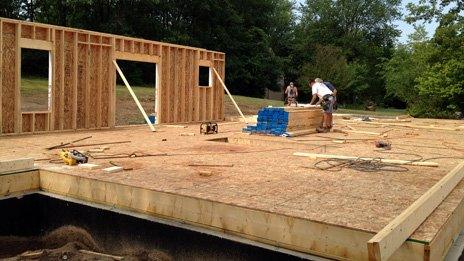US homeowners stuck in 'underwater' houses
- Published

The US housing market may slowly be rebounding. But the construction and buying binge of the mid-2000s will never return, and millions of American homeowners may never recover their investment.
Few people have seen quite so much of the property pain the US has been through as Heather Mooney.
For seven years she has been a foreclosure prevention officer in Washtenaw County, Michigan, trying to help those in tax arrears and mortgage debt.
She has watched as tens of millions of Americans have suffered astonishing losses when their properties fell in value following one of the biggest bubbles the market had ever seen.
Prices creep up
"On average in Washtenaw County, you are looking at a 20% loss," she says. "I'm certainly looking at $30,000 (£20,000) to $40,000 that I have lost in my own home."
About 40% of homeowners who own the area's more expensive properties owe more to the bank than their home is worth, she says. They're "underwater".
Across the US that figure is one in four, though it should fall as house prices creep up.
Ms Mooney's clients' stories are tangled tales of woe - arrears brought on by divorce and illness, banks racking up repayments as early discounts ended.
Aurora Lopez, 42, is one of them. She has a three-bedroom house in Ypsilanti's historic quarter. It has two stories - it's comfortable, not grand.
But when her mortgage repayments went from $770 a month to more than $1,800, arrears mounted and penalties kicked in.
"We purchased it for $135,000," she says, sitting at her dining table. "Right now the balance [on the mortgage] is $150,000."
"And the house is worth," she says, pausing briefly to recall the horrible number, "$75,000."
That's nuts, I say.
"Tell me about it. It's ridiculous. But you have to live somewhere. You have to keep on hoping, dreaming, this is the American dream. What you going to do?"
A seller's market?
Another little slice of that dream can be found just 10 minutes drive from downtown Ypsilanti.
Here, houses are set back from the road behind little lawns; children cycle beneath the trees that line the street; barbecues and basketball hoops wait for lazy summer days.
At the height of the boom, one-story houses changed hands for around $130,000. Now they might sell for $35,000.
In this neighbourhood, as across much of America, it looks like the market has rebounded from the bottom.
Real-estate agent Jim Manolakis places the trough in January.
"That's when we shifted from what has traditionally been a buyer's market in this area for the past five or six years," he says.
"We saw our inventory has reduced, we needed more homes to sell. What we see now is a seller's market."
Home sales are up - 10% in May from the year before. Home construction has rebounded, too. After years of dragging down the US economy, it is now contributing to its (albeit meagre) growth.
About 10 minutes outside Ann Arbor, what will eventually be a lovely big house is taking shape. The frame is going up, workmen stride over the boards wielding circular saws and nailguns. Country music - what else? - pumps out of a radio.
Ann Arbor Builders, who are doing the construction, employed about 30 people at the height of the boom. Now that's down to five.
But its president, Alex de Parry, who has been in the business since the early 1970s, says things have picked up since the leanest years of 2008 and 2009.
Why buy?
House building does more than line the pocket of real-estate agents. It also pumps money in the pockets of local craftsmen and manufacturers, he says.
"Lumber, steel, electrical, lighting, plumbing, mechanical, roofing, windows, doors," Mr de Parry lists the knock-on benefits.
"Our local suppliers benefit, manufacturers benefit, so there's a very pronounced ripple effect when new construction gets going again."
It will never be the same as 2004 and 2005, he says. Then, when his company was building 50 houses a year, there was too much easy money about.
But Americans still want to own their own homes, he reckons, and that's not going away, however bad the crash was.
Back in Ypsilanti, Tamara Tucker, a 35-year-old biology instructor, has picked up a bargain - a house that has seen $100,000 sliced from its value.
She bought it for her grandparents to live in, close to the house where she lives with her husband and child.
After the home has lost so much value, why buy?
"It depends on why you are buying a house," she says. "My generation, I think we came up at a time when buying a house was an investment, a house was an asset.
"Buying a house in this day and age is very different. It's really based on functionality in terms of buying a place on that's going to suit your family's needs and fit your budget."
Ms Tucker's attitude represents a big shift from just a few years ago. It harkens back to a time older Americans will recognise, when the ambition was simply to own a home, rather than to make huge sums selling it.
The recovery in housing is not spectacular. Many of those "underwater" will be there for some time, and it's difficult to see how people like Aurora Lopez will ever escape their burden.
But there is solid good news in the housing market, in an economy with too little of it about.